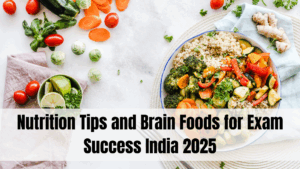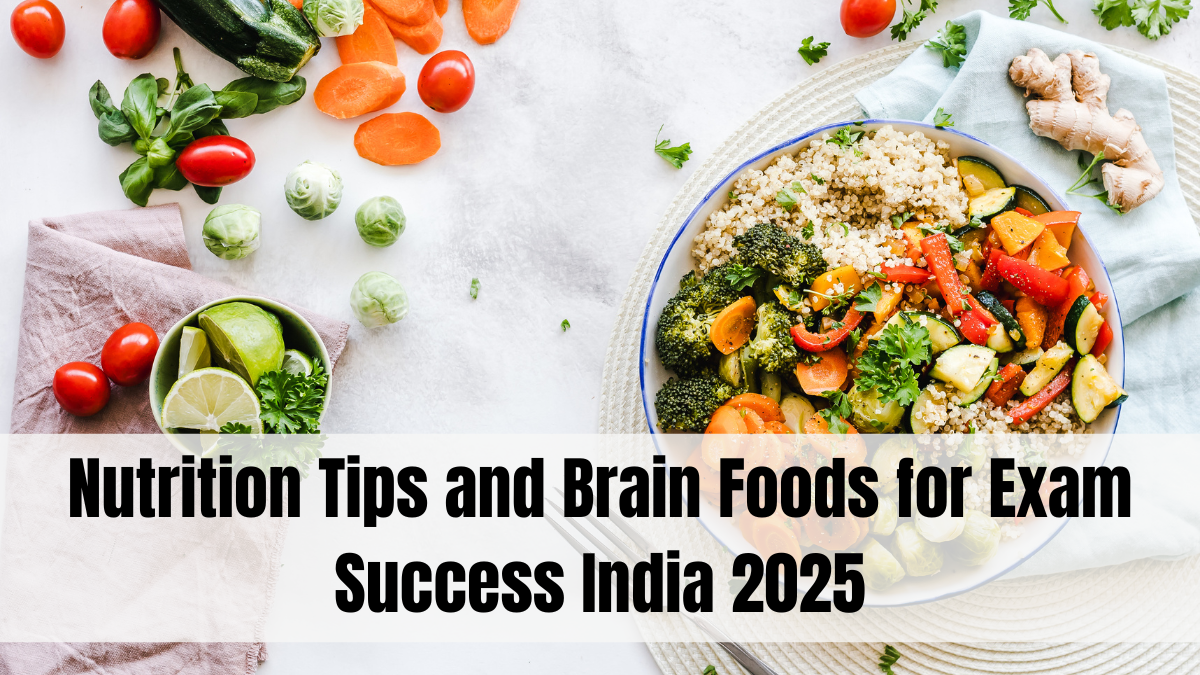Success in government and competitive exams depends not only on study strategies but also significantly on physical and mental well-being. Proper nutrition plays a vital role in enhancing cognitive functions like memory, concentration, and energy levels. In 2025, adopting targeted dietary habits can provide Indian students and aspirants a crucial edge in their exam preparation.
This article discusses essential nutrition tips and brain foods scientifically proven to support exam success, along with practical dietary advice.

Why Nutrition Matters for Exam Preparation
The brain requires a continuous supply of nutrients to maintain optimal function. Poor diet leads to fatigue, reduced focus, and increased anxiety, hindering learning and recall. Nutrient-rich foods support:
-
Neurotransmitter synthesis critical for memory and mood regulation.
-
Improved blood flow ensuring oxygen and glucose delivery to the brain.
-
Stabilized energy levels preventing midday slumps.
-
Enhanced stress resilience through balanced hormones.
A balanced diet primes the brain for peak performance during intensive study periods.
Top Brain-Boosting Foods for Exam Success
-
Omega-3 Fatty Acids: Found in walnuts, flaxseeds, and fish, omega-3s improve neuron communication and memory.
-
Berries: Blueberries and strawberries are rich in antioxidants that protect brain cells and enhance learning.
-
Dark Leafy Greens: Spinach and kale provide folate and vitamins that support cognitive function.
-
Whole Grains: Oats, brown rice, and quinoa release glucose slowly, ensuring steady energy supply.
-
Eggs: Rich in choline, eggs aid in memory retention and brain development.
-
Nuts and Seeds: Almonds, pumpkin seeds, and sunflower seeds provide magnesium and vitamin E, reducing mental fatigue.
-
Dark Chocolate: Contains flavonoids that boost blood flow to the brain and improve focus (consume in moderation).
-
Green Tea: Offers caffeine and L-theanine, which enhance alertness and calmness.
Including these in daily meals supports sustained mental sharpness.
Practical Nutrition Tips for Exam Toppers
-
Regular Meals: Avoid skipping meals to maintain glucose levels and avoid concentration dips.
-
Hydration: Drink at least 2-3 liters of water daily to prevent dehydration which impairs cognition.
-
Limit Processed Foods: Reduce intake of sugary snacks and junk food that cause energy crashes.
-
Balanced Macronutrients: Combine proteins, healthy fats, and carbohydrates in every meal for sustained energy.
-
Snack Smart: Opt for nuts, fruits, or yogurt over fried or sugary snacks.
-
Avoid Excess Caffeine: Moderate coffee or tea consumption to prevent jitteriness and sleep disturbances.
-
Good Sleep Nutrition: Foods like bananas, almonds, and chamomile tea promote restful sleep crucial for memory consolidation.
Smart dietary choices complement study efforts effectively.
Lifestyle Habits Supporting Nutritional Benefits
-
Consistent Sleep Schedule: Adequate rest enables brain recovery and learning consolidation.
-
Regular Physical Activity: Exercise increases blood flow and reduces stress hormones.
-
Mindfulness and Stress Management: Meditation and deep breathing enhance focus and emotional balance.
-
Avoid Excess Screen Time: Protects eyes and reduces mental fatigue.
Combining nutrition with healthy habits maximizes exam performance.
Government and Educational Initiatives Promoting Student Nutrition
-
School midday meal schemes provide balanced meals to support cognitive development.
-
Awareness campaigns in colleges emphasize diet’s role in exam success.
-
Nutrition counseling and workshops included in student welfare programs.
-
Collaboration with NGOs to improve rural student nutrition access.
These programs aim to create a supportive environment for student well-being.
FAQs
Which foods help improve memory and concentration?
Omega-3 rich foods, berries, nuts, and leafy greens are known to boost brain function.
How important is hydration during exam preparation?
Very important; dehydration negatively impacts focus and alertness.
Can caffeine help during exams?
In moderate amounts, yes, but excessive intake causes anxiety and sleep issues.
Are supplements necessary for exam success?
Balanced diet is preferable; supplements only if advised by a healthcare professional.
What foods should be avoided while studying?
Sugary snacks, processed foods, and excessive fried items that cause energy crashes.
Click here to know more.
